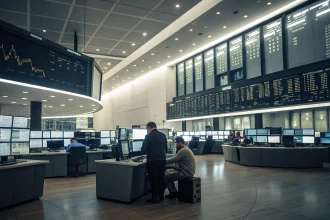Financial markets showed a measured response to President Donald Trump’s military strike against Iran, according to Ryan Payne, President of Payne Capital Management. Speaking on Fox Business Network’s “Mornings with Maria,” Payne provided analysis of how investors are interpreting the geopolitical development.
The military action, which comes amid ongoing tensions between the United States and Iran, initially caused some market volatility as investors assessed potential implications for global stability and oil prices. However, Payne noted that markets have demonstrated resilience in the face of the news.
Market Reaction and Investor Sentiment
According to Payne, the initial market reaction included a spike in oil prices and a flight to traditional safe-haven assets such as gold and U.S. Treasury bonds. However, major stock indices showed more restraint than might have been expected given the significance of the military action.
“What we’re seeing is a much more calculated response from investors than in previous geopolitical crises,” Payne explained during the interview. “There’s an understanding that while this action increases tensions, it doesn’t necessarily signal a broader conflict that would disrupt global markets long-term.”
Payne highlighted that energy sector stocks saw notable movement as traders factored in potential disruptions to oil supplies from the Middle East region. Defense contractors also experienced share price increases as investors considered possible military escalation.
Economic Implications
The financial expert outlined several economic factors that investors should monitor following the strike:
- Oil price stability and its impact on consumer spending
- Potential Federal Reserve response if economic conditions change
- Effects on international trade relationships
- Consumer confidence indicators in coming weeks
“The key question for markets isn’t just about this single military action, but whether it leads to a chain of events that could impact global economic growth,” Payne stated. “So far, markets are signaling this is a contained situation.”
He added that the U.S. economy’s reduced dependence on Middle Eastern oil compared to previous decades has helped limit market concerns about potential supply disruptions.
Investment Strategy Recommendations
During the interview, Payne offered guidance for investors navigating the current environment. He suggested maintaining diversified portfolios while being cautious about making dramatic changes based solely on geopolitical headlines.
“History shows us that markets typically recover quickly from geopolitical shocks unless they trigger broader economic problems,” Payne noted. “Smart investors are staying focused on fundamentals like corporate earnings, interest rates, and economic data rather than making emotional decisions.”
“The worst thing investors can do right now is panic sell based on headlines. These situations often create buying opportunities for those with a long-term perspective,” Payne emphasized.
Payne also discussed specific sectors that might benefit or face challenges in the current environment, pointing to energy, defense, and certain technology segments as areas of interest for investors seeking to adjust portfolios.
As markets continue to process the implications of the military action, Payne recommended that investors maintain regular communication with their financial advisors and avoid making impulsive decisions based on short-term market movements or breaking news.
The coming days will likely provide more clarity on both the geopolitical situation and the longer-term market impact as investors gain additional information about potential responses from Iran and other global powers.









